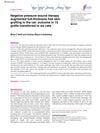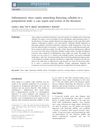 34 citations,
September 2019 in “Clinical, Cosmetic and Investigational Dermatology”
34 citations,
September 2019 in “Clinical, Cosmetic and Investigational Dermatology” Light therapy can stimulate hair growth and is more effective when started early, but more research is needed on its long-term effects and optimal use.
 21 citations,
February 2015 in “Journal of Feline Medicine and Surgery”
21 citations,
February 2015 in “Journal of Feline Medicine and Surgery” Negative pressure wound therapy is effective for skin grafts in cats.
 3 citations,
October 2023 in “Military Medical Research/Military medical research”
3 citations,
October 2023 in “Military Medical Research/Military medical research” Regulatory T cells help heal skin and grow hair, and their absence can lead to healing issues and hair loss.
 1 citations,
April 2023 in “Frontiers in Immunology”
1 citations,
April 2023 in “Frontiers in Immunology” New treatments for hair loss from alopecia areata may include targeting immune cells, using stem cells, balancing gut bacteria, applying fatty acids, and using JAK inhibitors.
 March 2024 in “Stem cell research & therapy”
March 2024 in “Stem cell research & therapy” Human dental pulp stem cell-conditioned medium, especially from hypoxic conditions, may help treat chemotherapy-induced hair loss and does not increase cancer risk.
 January 2023 in “IGI Global eBooks”
January 2023 in “IGI Global eBooks” Cannabis may help with skin and hair health but could also increase heart and stroke risks.
January 2022 in “Clinical Cases in Dermatology” Early treatment of traction alopecia can reverse hair loss; prevention involves avoiding tight hairstyles.
 January 2008 in “Pratique médicale & chirurgicale de l'animal de compagnie”
January 2008 in “Pratique médicale & chirurgicale de l'animal de compagnie” Alopecia X in dogs is a cosmetic issue, not a hormonal disorder, and harmful treatments should be avoided.
 January 2024 in “Journal of cellular immunology”
January 2024 in “Journal of cellular immunology” Hair follicle stem cells are important for maintaining healthy skin and interact with many signals.
 2 citations,
May 2022 in “JAAD Case Reports”
2 citations,
May 2022 in “JAAD Case Reports” A woman lost all her hair after mild COVID-19, but it started to regrow after treatment with a specific medication.
 September 2024 in “Journal of the European Academy of Dermatology and Venereology”
September 2024 in “Journal of the European Academy of Dermatology and Venereology” Baricitinib effectively reduces hair loss in severe alopecia areata with mild side effects.
 June 2023 in “Dermatology and therapy”
June 2023 in “Dermatology and therapy” The Middle East and Africa need better data, treatment consensus, and support for Alopecia Areata.
 1 citations,
July 2023 in “Journal of Clinical Medicine”
1 citations,
July 2023 in “Journal of Clinical Medicine” Different causes of beard hair loss have various treatments, including medications, lifestyle changes, and procedures to stimulate hair growth.
 September 2024 in “Current Oncology”
September 2024 in “Current Oncology” Docetaxel often causes hair loss, with limited effective treatments and no cure for permanent hair loss.
 8 citations,
January 2008 in “PubMed”
8 citations,
January 2008 in “PubMed” Mesotherapy for the scalp can cause severe infections, fat tissue death, and permanent hair loss.
 4 citations,
March 2023 in “Current Oncology”
4 citations,
March 2023 in “Current Oncology” Scalp cooling is the only FDA-approved method to prevent hair loss from chemotherapy, but other treatments like minoxidil and PRP are being tested.
 April 2019 in “The journal of investigative dermatology/Journal of investigative dermatology”
April 2019 in “The journal of investigative dermatology/Journal of investigative dermatology” High potency topical steroids are the most effective treatment for pediatric alopecia areata.
 10 citations,
October 2015 in “Journal of the International Association of Providers of AIDS Care”
10 citations,
October 2015 in “Journal of the International Association of Providers of AIDS Care” A woman with HIV had a severe skin condition that improved with antiretroviral therapy.
 131 citations,
May 2015 in “Experimental Dermatology”
131 citations,
May 2015 in “Experimental Dermatology” Microneedles help improve skin appearance and deliver skin treatments effectively, but safety concerns need more research and regulation.
 29 citations,
April 2013 in “Mycoses”
29 citations,
April 2013 in “Mycoses” A young man was initially misdiagnosed with a scalp condition but was found to have a fungal infection, which improved with antifungal treatment.
Adding zinc to papaya extract speeds up wound healing.
4 citations,
December 2022 in “Al-mağallaẗ al-ʻirāqiyyaẗ li-l-ʻulūm al-bayṭariyyaẗ/Iraqi journal of veterinary sciences” Tioconazole cream is highly effective and easy to use for treating sheep dermatophytosis.
44 citations,
August 2014 in “Anais brasileiros de dermatologia/Anais Brasileiros de Dermatologia” Methotrexate is a promising and safe treatment for severe alopecia areata, with better results when combined with corticosteroids.
 5 citations,
April 2023 in “BMC Microbiology”
5 citations,
April 2023 in “BMC Microbiology” Shampoo with heat-killed Lacticaseibacillus paracasei GMNL-653 improves scalp health and hair growth by changing scalp bacteria.
4 citations,
January 2018 in “Health” Ostrich antibodies are a promising, cost-effective treatment for various skin diseases and conditions.
2 citations,
August 2022 in “Animals” Essential oils may improve dogs' health and melatonin can help with their sleep and anxiety, but both should be used carefully.

Melatonin and photobiomodulation are effective for treating Alopecia X in German Spitz dogs.

A girl with Crohn's disease developed hair loss due to her increased medication, a rare side effect seen in some children.
 4 citations,
June 2022 in “BioMed Research International”
4 citations,
June 2022 in “BioMed Research International” Using mesenchymal stem cells or their exosomes is safe for COVID-19 patients and helps improve lung healing and oxygen levels.
 August 2023 in “Authorea (Authorea)”
August 2023 in “Authorea (Authorea)” Tinea capitis should be considered in adults with scalp issues for proper treatment.























